PHUKET: The United Nations human rights office today urged the Government of Thailand to drop criminal defamation charges against two journalists who wrote about the alleged involvement of the Thai Navy with human trafficking.
''Criminal prosecution for defamation has a chilling effect on freedom of the press,'' said Ravina Shamdasani, the spokesperson for the Office of the High Commissioner for Human Rights (OHCHR). ''International standards are clear that imprisonment is never an appropriate penalty for defamation.''
Editor Alan Morison and reporter Chutima Sidasathian, who write for Phuketwan, a small English-language newspaper based on one of the Thai islands, cited a Reuters investigative report alleging the involvement of Thai naval security forces in smuggling Rohingya asylum-seekers fleeing Myanmar, where ethnic Rakhine Buddhists and Rohingya Muslims have been clashing since last year.
Mr. Morison and Ms. Sidasathian have also been charged for breaching the Computer Crimes Act for publishing the 17 July online article.
Ms. Shamdasani stressed the essential role media plays in imparting information and promoting transparency and accountability on this important issue.
''The criminal charges against Mr. Morison and Ms. Chutima could have serious implications on Phuketwan's future operations, possibly compromising its ability to report on issues related to Rohingya asylum-seekers to the public,'' she noted.
If convicted, they face up to two years' imprisonment on the criminal defamation charges and five years in prison for breaching the Computer Crimes Act, as well as fines equivalent to $3125.
The Computer Crimes Act, which came into force in Thailand in 2007, seeks to bar the spread of material believed to threaten national security or create panic.
The Act has been criticized by Special Rapporteur on the right to freedom of opinion and expression Frank La Rue, an independent UN expert, for being ''vague and overly broad, and the harsh criminal sanctions are neither necessary nor proportionate to protect the monarchy or national security.''
Reporters Prepared for Prison:
http://www.bangkokpost.com/news/local/387125/reporters-prepared-for-prison-in-navy-defamation-lawsuit/
What the United Nations Human Rights chief said:
http://www.un.org/apps/news/story.asp?NewsID=46828&Cr=thailand&Cr1=#.UrxkbdIW3dk/
''Criminal prosecution for defamation has a chilling effect on freedom of the press,'' said Ravina Shamdasani, the spokesperson for the Office of the High Commissioner for Human Rights (OHCHR). ''International standards are clear that imprisonment is never an appropriate penalty for defamation.''
Editor Alan Morison and reporter Chutima Sidasathian, who write for Phuketwan, a small English-language newspaper based on one of the Thai islands, cited a Reuters investigative report alleging the involvement of Thai naval security forces in smuggling Rohingya asylum-seekers fleeing Myanmar, where ethnic Rakhine Buddhists and Rohingya Muslims have been clashing since last year.
Mr. Morison and Ms. Sidasathian have also been charged for breaching the Computer Crimes Act for publishing the 17 July online article.
Ms. Shamdasani stressed the essential role media plays in imparting information and promoting transparency and accountability on this important issue.
''The criminal charges against Mr. Morison and Ms. Chutima could have serious implications on Phuketwan's future operations, possibly compromising its ability to report on issues related to Rohingya asylum-seekers to the public,'' she noted.
If convicted, they face up to two years' imprisonment on the criminal defamation charges and five years in prison for breaching the Computer Crimes Act, as well as fines equivalent to $3125.
The Computer Crimes Act, which came into force in Thailand in 2007, seeks to bar the spread of material believed to threaten national security or create panic.
The Act has been criticized by Special Rapporteur on the right to freedom of opinion and expression Frank La Rue, an independent UN expert, for being ''vague and overly broad, and the harsh criminal sanctions are neither necessary nor proportionate to protect the monarchy or national security.''
Reporters Prepared for Prison:
http://www.bangkokpost.com/news/local/387125/reporters-prepared-for-prison-in-navy-defamation-lawsuit/
What the United Nations Human Rights chief said:
http://www.un.org/apps/news/story.asp?NewsID=46828&Cr=thailand&Cr1=#.UrxkbdIW3dk/

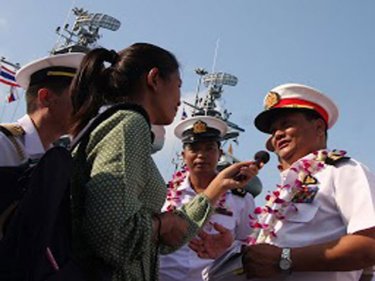


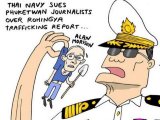





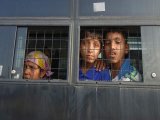

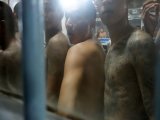
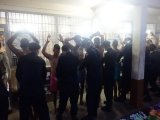


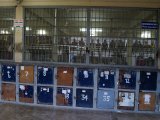

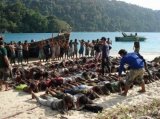


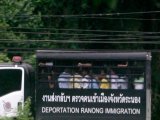


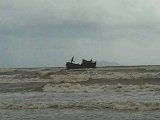
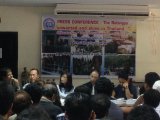

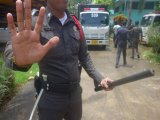
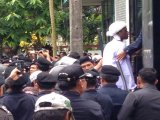



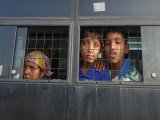





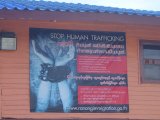
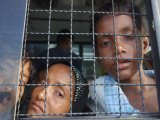
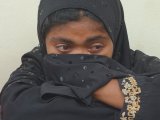

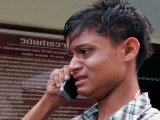



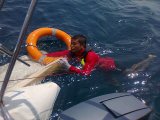
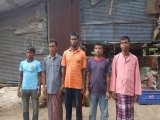
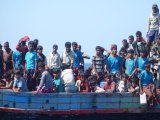
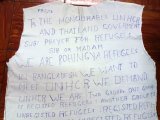
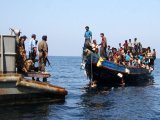





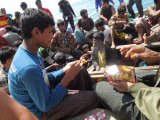
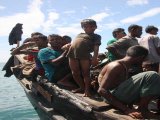



Farangs are here to retire, earn a living or even better a fortune, if that is possible. Who knows? Will we do better if the Democratic faction of business takes over from the Thasin elite business people? Either business
elite has no respect for Human Rights and the intellectual elite in Thailand seems not to have any say in politics, clarity, ethical principles of action. Some academics critizised the methods the protest leader proposed to use to replace democratic elections, though these arrangements, remembering us of Mussolinis methods, were presented as temporary until elections could be done so that even the Democratic party could win an election.
I cannot understand that the majority is so lame and accepts that elections are prevented or declared by the minority as illigitimate. You may ask if it is rigged to create a situation that seemingly again will legitimize that the military takes over again, like in the past in Turkey and certainly elsewhere also?
The international community is not even upset with this effort by a party that did not win an election by presenting policies that benefit people, which the populist Thaksin did in the early years of this century.
In such a situation, will the Navy even consider the UN Human Rights body? The Government seems not to be interested in its own reputation.
Posted by Bo Jonsson on January 2, 2014 18:56